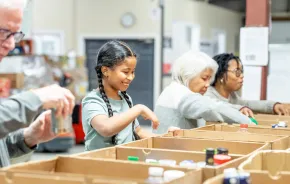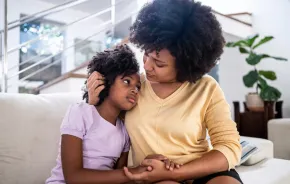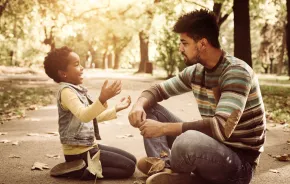
Lisa Hallett is on the run — literally. On the day we met, Hallett was busy shuttling her three kids to camps, fielding emails as the executive director of a nonprofit she cofounded and training for her next race, an Ironman Triathlon in Arizona.
It’s a daunting schedule, but for Hallett, it’s a familiar and comforting routine. Hallett turned to running after her husband, Army Capt. John Hallett, was killed in action in Afghanistan in 2009.
“My world was upside-down,” says Hallett of that time. She learned of her husband’s death with her 3-week-old baby on her hip — a baby John never got to meet.
Hallett had long used running as a way to cope with her husband’s deployments and the family’s frequent moves, but following his death, she found new solace in the activity. She recalls a run she took with friend Erin O’Connor through their Dupont neighborhood in the days immediately following the news. Soon, others joined them in a show of support. Eventually, in the parking lot of a nearby Burger King, her nonprofit was born.
Wear blue: run to remember has four chapters around the country and 45 regular meetups; Hallett and O’Connor officially founded it together in 2009. Each chapter hosts a weekly run where participants gather in a circle and say the names of those for whom they run.
That mission of remembrance carries over to wear blue: run to remember events. Runners honor fallen service members during the “wear blue Mile,” a mile of the course along which supporters wave American flags in front of large posters showing the photo of a fallen service member. (Wear blue members don’t have to be connected to the military; all are welcome to participate, Hallett says.)
The goal? Create “a living memorial for our country’s fallen military members” and, in doing so, support the families left behind by getting them moving in a new direction.
What is it about running that you think helps a family dealing with absence or grief?
When you’re training for a run, you have this purpose to move forward — literally and figuratively.
The first time we met, we didn’t know what this looked like, where we were going or what we were doing, but we just knew we had to do [it] … and we [ran] around the airfield. And then the following week, we said, “We should say their names,” and so we started to say the names of the men and women who had been killed so far in that deployment.
It all felt very out of our control, but when we gathered on those weekly runs, it was something we could control, and even if it was only for that moment, it was something we could do. We could keep their stories alive in our steps, and we could grow stronger in the experience — literally and figuratively — as we tackled each of those runs.
Everyone has a place in this community. There are days we give strength and days we receive strength.
What are you looking forward to right now?
I’m really excited about the second year of our Gold Star Youth Mentorship Program, which is in partnership with Big Brothers Big Sisters of Southwest Washington, through the support of USO Jermaine Kearse 15 to 1 Programs. [This local foundation was started by former Seattle Seahawk Jermaine Kearse to support children in military families.]
[In the Gold Star Youth Mentorship Program,] each child is matched with an active-duty service member who has been screened by the Big Brothers and Big Sisters organization. Then, they train for a race together. It’s just wonderful for these children who have sacrificed so much to get to have this relationship and something just for them.
Many of our Gold Star children [had] parents who passed away before they really had a chance to be exposed to a life of service and to really know their parents. For example, my husband, John, was killed three weeks after Heidi was born, so she never really got to know her daddy and she never got to be a military kid. In this program, we’ve been able to illuminate John’s life by illuminating a life of service.
You and your husband grew up together in California. Why did you choose to make the Northwest your home?
We have always had tremendous community support [in the Northwest]. I have a neighbor who brought my garbage cans up — not for days or weeks, but for years. I finally had to tell him the kids were old enough to do it. I like that this is a part of the country where we can live the social ideals we value; we’re also a very active family, so I love that we can hike or get outside whenever we have time.
Are all wear blue runners athletes? Can anyone join in?
Athletes or future athletes! We run in Dupont every Saturday. Come join us!
This story appears in ParentMap's November 2017 print edition. Subscribe today!











